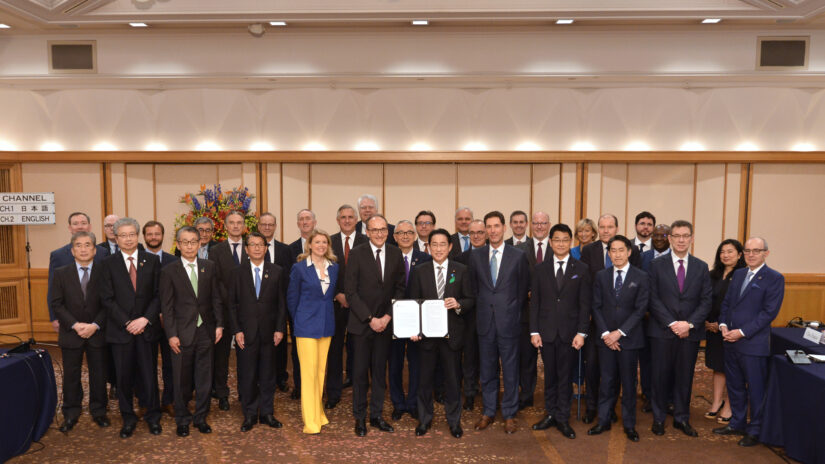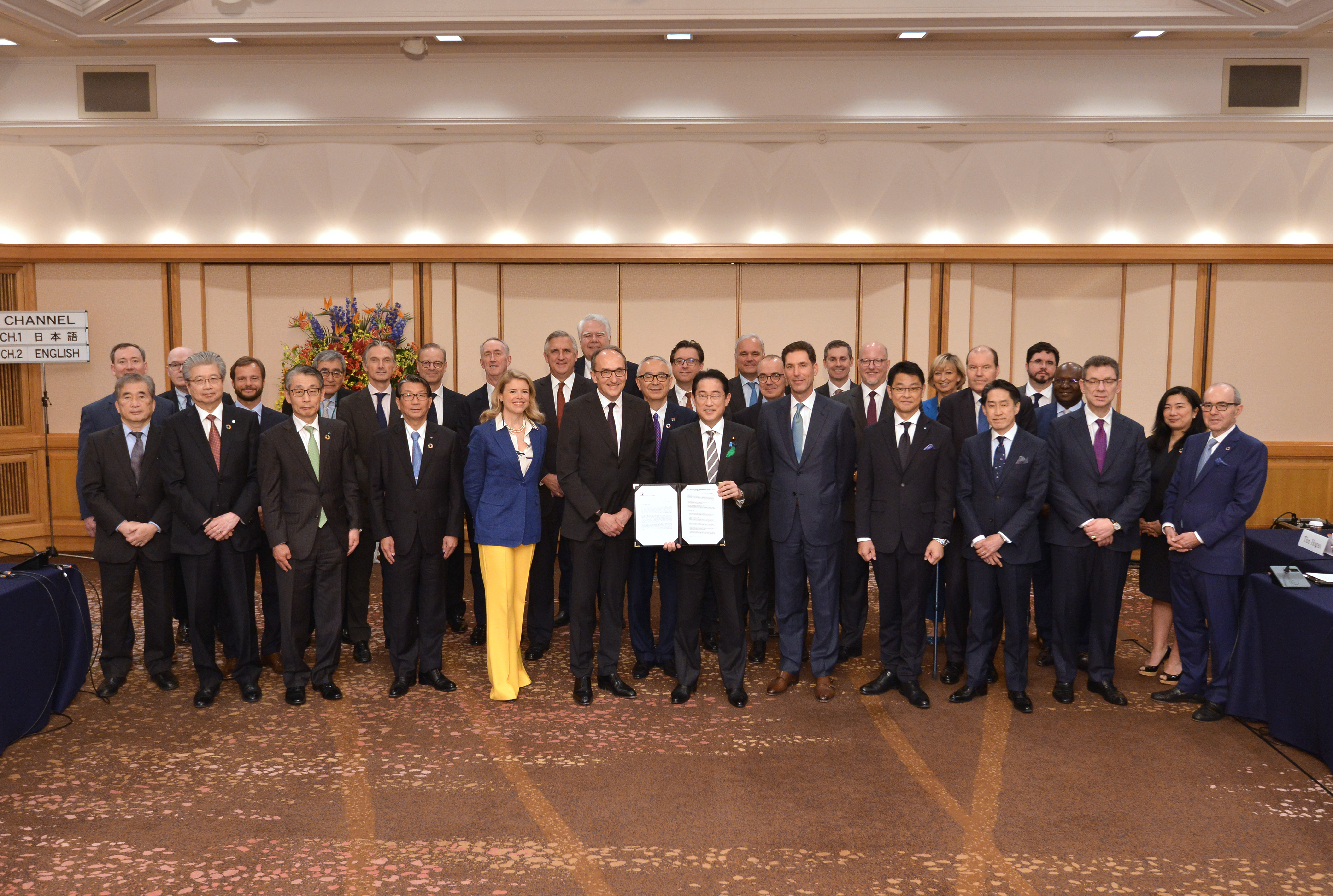Top pharma leaders meet with Japanese officials to discuss G7 global health priorities and strategic dialogue for life science growth in Japan
Downloads
Press release- Tokyo Statement on Global Health Priorities
- BCR Letter to PM Kishida
- JPMA PhRMA EFPIA Joint Statement
- Photo
- Press conference
Share

A delegation of 24 CEOs from the Biopharmaceutical CEOs Roundtable (BCR) met with Japanese Prime Minister Fumio Kishida and other officials in Tokyo on April 13-14. They praised Japan’s efforts in promoting innovation to address future pandemics, Universal Health Coverage goals, and combat antimicrobial resistance.
The meeting took place a month before Japan hosts the G7 Hiroshima Summit. The CEOs presented the Tokyo Statement of the BCR to PM Kishida, which outlined top priorities for addressing global health challenges. They also discussed the importance to strengthen the innovation ecosystem in Japan and proposed establishing a strategic dialogue platform to enhance Japan’s leadership position in the life science sector by fostering innovation that benefits both patients and economic growth.
The BCR delegation shared in their meetings the lessons learned in bringing innovation to help mitigate the devastating impact of COVID-19 and underscored the necessity to strengthen the power of science and an innovation ecosystem built on the protection of intellectual property rights and free access to pathogens. BCR also presented their proposal “Biopharmaceutical Industry Vision for Equitable Access in Pandemics,” originally shared with the German government during its G7 Presidency. In this proposal, industry commits to reserve part of real-time production of vaccines, treatments, and tests in future pandemics for allocation to vulnerable populations in low-income countries.
The Tokyo Statement, released today, outlines the biopharmaceutical industry’s priorities for progress in global health. The statement emphasizes the crucial role of Universal Health Coverage (UHC) in establishing robust healthcare systems and fostering a dynamic innovation ecosystem to address current and future global health challenges. This include an aging population, increasing rates of antimicrobial resistance, gaps in immunization, and emerging infectious diseases. Furthermore, the industry, which managed to develop and scale up manufacturing of COVID-19 vaccines, tests, and treatments in record speed, reiterates its commitment to combatting these challenges through the development of innovative vaccines, treatments, and diagnostics, while ensuring equitable access.
Over 250 public-private partnerships involving biopharmaceutical companies across low- and middle-income countries contribute to strengthening health systems and improve access to medicines. The biopharmaceutical industry is committed to addressing global health challenges through industry-funded collaborations to develop new, innovative treatments where none currently exist. For example, initiatives such as the $1 billion AMR Action Fund and $6 million GHIT Fund to combat neglected diseases show the industry’s dedication to partnering with others to tackle current health challenges and to better prepare the world for future pandemics. BCR members believe health solutions to access and strengthen the innovation ecosystem require multi-stakeholder engagement.
The sustainability of innovation is crucial to all health topics on the G7’s health agenda. Many countries are experiencing economic downturns while facing increasing demands from their populations, including non-communicable diseases and aging. To mitigate the health and economic fallout of this challenge, innovation is key, and the health benefits of medicines, vaccines, and diagnostics should be seen as an investment in the future, rather than a cost, while also considering their holistic societal value.
Japan has long been a global leader in life sciences and is a critically important partner in developing new medicines for patients around the world. The biopharmaceutical industry has invested ¥14 trillion in R&D in Japan over the last decade. It is developing over 1,500 new medicines in Japan and is directly supporting over 140,000 jobs.
To ensure continued growth in the sector in Japan, which fuels economic growth, security, and timely access to new medicines, the BCR delegation discussed with the Japanese leadership the possibility of forging a public-private strategic dialogue to address constructive proposals on drug pricing reform to strengthen Japan’s biopharmaceutical innovation ecosystem. In recent years, the innovation gap, and the time it takes for new innovative medicines to reach Japanese patients, has grown. To help address these issues, industry put forward three policy proposals.
Jean-Christophe Tellier, Chairman of BCR, President of IFPMA, CEO and Chairman of the Executive Committee of UCB said: “We’ve had the honour of meeting the Japanese PM, eminent Ministers, and senior government officials. Japan has been a highly respected champion of progress in global health, and its leadership of this G7 will be instrumental in shaping how we come out of the COVID-19 pandemic. In addition, we welcome the recognition of the need to strengthen the biopharmaceutical innovation ecosystem in Japan. To support this ambition, we respectfully request establishing a public-private strategic dialogue to advance early-stage research and development (R&D) efforts, regulatory harmonization and drug pricing reform.”
David A. Ricks – Chairman and Chief Executive Officer, Eli Lilly and Company, Former Chairman of BCR, Former President of IFPMA, said: “Japan played a huge role in the global community’s fight against COVID-19. At the root of our success against the pandemic has been the power of science and an innovation ecosystem that allowed the private sector – in collaboration with governments and policymakers around the world – to do what it does best: bring innovations to market quickly and at scale. As plans for future pandemic preparedness plans progress, it is critically important to prioritize and further strengthen this innovation ecosystem, which is built upon the protection of intellectual property rights, a vibrant private sector, and fair value for innovation. This is what we have requested G7 leaders to consider as part of the Tokyo Statement shared with Prime Minister Kishida.”
Sunao Manabe, Vice-Chair of BCR, Vice President of IFPMA, Representative Director, Executive Chairperson & CEO of Daiichi Sankyo, said: “We applaud Japan’s ambition to advance UHC, especially at a time where the pandemic has reversed recent gains in global health outcomes. The biopharmaceutical industry is a steadfast partner in helping improve health systems readiness and resilience, which is critical to achieving UHC. I believe our industry is on the cusp of some of the greatest medical breakthroughs in decades, discoveries that were unimaginable only a few years ago. Working together, we are confident that we can continue to bring the most innovative medicines to patients in Japanese and around the world.”
Thomas Cueni, Secretary of BCR, Director General of IFPMA, said: “The Tokyo Statement reinforces the biopharmaceutical industry’s commitment to global health progress, striving to develop valuable medicines, vaccines, and diagnostics for patients in need. We are dedicated to innovation and practical solutions for problems that prevent people from receiving necessary help. For instance, the commitment of industry leaders to reserve a real-time production allocation of vaccines, treatments, and diagnostics for priority populations in lower-income countries, and making them accessible and affordable for future pandemics, is a significant solution to overcome the inequitable rollout during the COVID-19 pandemic. In order for this to work, we urge the G7 to take bold action in signing up to a social contract for greater equity in future pandemics.”

About IFPMA
The International Federation of Pharmaceutical Manufacturers and Associations (IFPMA) represents over 90 innovative pharmaceutical companies and associations around the world. Our industry’s almost three million employees discover, develop, and deliver medicines and vaccines that advance global health. Based in Geneva, IFPMA has official relations with the United Nations and contributes industry expertise to help the global health community improve the lives of people everywhere. For more information, visit ifpma.org.
Learn more



